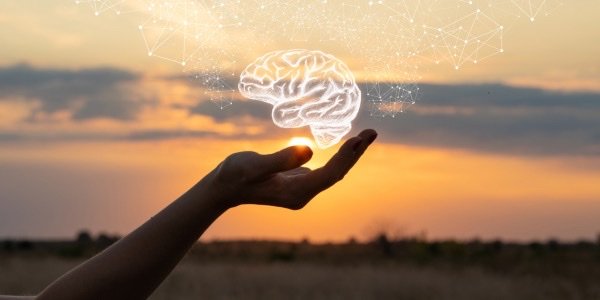Before we get started, it is important to note that the term ‘dementia’ is actually an umbrella term that describes many different types of diseases. Dementia is not a disease in itself, but rather the symptoms of these diseases. When we talk about the different types of diseases, we are talking about Alzheimer’s, vascular dementia, Lewy body dementia and more, that cause the symptoms of dementia. To illustrate, people with Alzheimer’s Disease will have symptoms of dementia, but not every person that has dementia has Alzheimer’s Disease. Let’s take a closer look below at some of the most common types of diseases that have symptoms of dementia.
Alzheimer’s Disease
The most common form of dementia is Alzheimer’s Disease. The condition is more common in older age groups, but people of all ages can develop it. Lifestyle factors can increase the risk of developing Alzheimer’s, such as smoking, drinking alcohol, high cholesterol, diabetes, lack of physical activity and obesity.
As a progressive condition, Alzheimer’s symptoms may start smaller, such as short-term memory loss or repeating the same thing. It can progress differently for everybody as it affects certain parts of the brain. There is no cure for Alzheimer’s, but medications can slow the decline in memory. There is also constant research being done to improve the lifestyles of people living with dementia.
Vascular dementia
Another common form of dementia is vascular dementia. As the name suggests, the condition develops when the brain is damaged by restricted blood flow. The causes are typically single or multiple strokes, but also other vascular conditions. High blood pressure and diabetes can be a direct cause, along with lifestyle factors such as diet, smoking, alcohol use and more. Those with heart conditions are also susceptible to vascular dementia. Again, there is no cure, but medications can manage contributing conditions, while occupational therapy is also helpful.
Lewy body disease
Lewy bodies are microscopic and found within the brain cells of people with Parkinson’s disease and dementia. The conditions often go hand-in-hand, and when both are present, it is known as Lewy Body Disease (LBD). Because a type of dementia is already present after or before the diagnosis of Parkinson’s Disease, the specific symptoms of LBD are quite different. They include anxiety, depression, fainting, constipation and incontinence. Tiredness and a reduced sense of smell. At the moment, LBD is difficult to diagnose, but those with Parkinson’s disease are in a high-risk group.
Frontotemporal dementia
Frontotemporal dementia is slightly different from some people’s idea of ‘traditional’ dementia because, often, memory isn’t affected in the early stages. Rather, frontotemporal dementia can affect language, behaviour, movement and personality. The disease has different variations, generally categorised by which part of the brain (and, therefore, which function) is affected first. It is a progressive condition affecting the frontal or temporal lobes of the brain.
Creutzfeldt-Jakob disease
While quite rare, Creutzfeldt-Jakob disease (CJD) is a fast-acting form of dementia that affects a person’s ability to move, speak and take care of themselves. Unfortunately, scientists still know very little about the origins of CJD, nor are there medications available to cure or slow progression. Being a neurological disease, CJD can affect many of the body’s primary functions, such as memory, planning, judgement, walking, speaking and vision.
Huntington’s disease
Another progressive brain disorder, Huntington’s disease, is caused by a defective gene. While the gene defect can be identified, it can’t yet be treated or avoided. The most common symptoms include uncontrolled body movements and a decline in thinking and reasoning skills. Memory, concentration and mood can all be affected, too. This defect is known as ‘dominant’, which means if one of your parents has Huntington’s, you’ll likely develop it too.
Posterior cortical atrophy
Posterior cortical atrophy (PCA) is a rare type of dementia. Rather than affecting the frontal or temporal lobes, PCA affects the cortex (the outer layer of the brain) in the back of the head. Symptoms are similar to that of Alzheimer’s disease, with many suggesting that PCA may, in fact, be a variant of Alzheimer’s. However, many people with PCA have symptoms more like those of Lewy Body or CJD. PCA primarily affects the brain’s ability to process visual information.
Normal pressure hydrocephalus
A buildup of fluid in the brain can lead to a condition called normal pressure hydrocephalus (NPH). People with NPH often experience a decline in reasoning and thinking skills. They may also have trouble walking and experience incontinence. People who suffer head injuries or other brain trauma can develop NPH, however in many cases, the causes are still unknown.
Korsakoff syndrome
Sometimes known as Wernicke-Korsakoff Syndrome or alcohol-related dementia, Korsakoff syndrome is a chronic memory disorder. Severe vitamin B-1 (thiamine) deficiencies cause the disease, with alcohol misuse being a major contributing factor. People living with AIDS and some forms of cancer can also lead to Korsakoff syndrome. There is still little known about how the disease works, but memory is the most affected function.
If you or a loved one is experiencing a form of dementia, there is help available. Group Homes Australia offers a range of services, resources and advice for families, so please don’t hesitate to contact us.






0 Comments